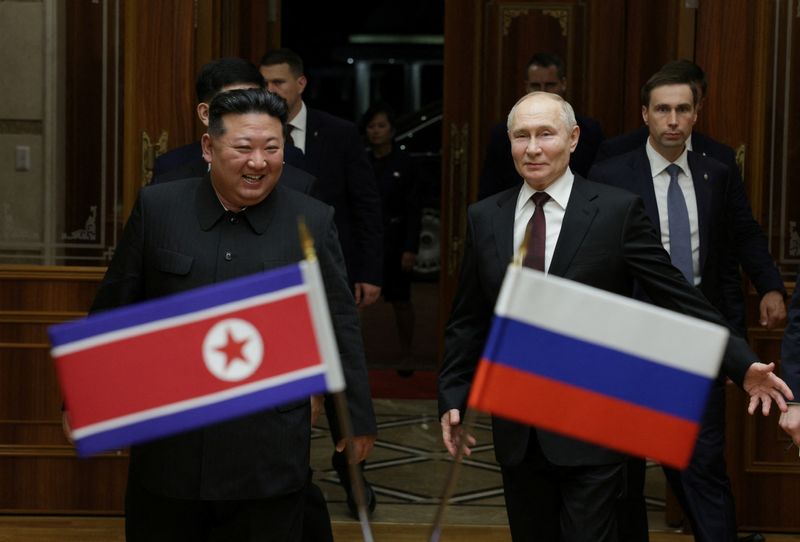Author: Hyonhee Shin, Josh Smith and Guy Faulconbridge
SEOUL/MOSCOW (Reuters) – Russian President Vladimir Putin arrived in North Korea on Wednesday for his first visit in 24 years, vowing to deepen trade and security ties with the reclusive nuclear weapons state and support North Korea in its fight against the United States.
Russian official media said that Putin’s special plane landed in Pyongyang around 2:45 a.m. after a brief stop in the Russian Far East.
The United States and its Asian allies are trying to figure out how far Russia will go in supporting leader Kim Jong Un of North Korea, the only country in the 21st century to conduct nuclear weapons tests.
Before arriving in North Korea, Putin praised Pyongyang for resisting what he said was U.S. economic pressure, blackmail and threats, a sign that Russia, a veto-wielding member of the U.N. Security Council, is reassessing its overall approach to North Korea.
In an article published by North Korea’s state media, Putin praised Kim as “comrade” and pledged to “jointly resist illegal unilateral restrictions”, develop trade and enhance security across Eurasia.
Putin said in an article published on the front page of Rodong Sinmun, the mouthpiece of the Workers’ Party of Korea, that “Washington refuses to implement previously reached agreements and continues to make new, increasingly stringent and clearly unacceptable demands.”
Russia has always supported and will continue to support the Democratic People’s Republic of Korea and the heroic Korean people against insidious, dangerous and aggressive enemies.
Putin issued a presidential decree on the eve of his visit, saying that Moscow hopes to sign a “comprehensive strategic partnership treaty” with North Korea. His foreign policy adviser Yuri Ushakov said this would include security issues.
Ushakov said the agreement would not target any other country but would “outline prospects for further cooperation.”
Putin noted that the Soviet Union was the first country to recognize the Democratic People’s Republic of Korea, founded by Kim Jong Un’s grandfather, Kim Il Sung, less than two years after the 1950 Korean War.
North Korean state media also published articles praising Russia and supporting military action in Ukraine, calling it a “holy war for all Russian citizens.”
America’s concerns
Putin’s state visit comes as the United States accuses North Korea of providing Russia with “dozens of ballistic missiles and more than 11,000 containers of ammunition” for use in Ukraine. South Korea, a staunch U.S. ally, has raised similar concerns.
The White House said on Monday it was troubled by deepening ties between Russia and North Korea. The U.S. State Department said it was “fairly certain” Putin would seek weapons to support his war in Ukraine.
Moscow and Pyongyang deny arms transfers but vow to strengthen military ties that could include joint exercises.
Russia will produce more ammunition this year than the entire NATO military alliance, so Putin’s trip may be aimed at highlighting Moscow’s destructive power in a series of global crises.
Russia in March vetoed the annual update of a panel of experts that monitors implementation of long-standing U.N. sanctions against North Korea over its nuclear and ballistic missile programs.
grand concert
Russia’s Interfax news agency quoted Putin aide Ushakov as saying that the visit would include one-on-one discussions between the two leaders, as well as a grand concert, state reception, guard of honor, document signing and presentation of the message. Statements issued by the media.
Russian Defense Minister Andrei Belousov, Foreign Minister Sergey Lavrov, the Ministers of Natural Resources, Health and Transport, the heads of Roscosmos and its railways, as well as Putin’s energy core Character, Deputy Prime Minister Alexander Novak will participate in this meeting.
Ahead of the visit, North Korea appears to have been preparing for a possible military parade in central Pyongyang, commercial satellite images show.
Victor Cha, a former U.S. national security official now at the Center for Strategic and International Studies, said the summit posed the greatest threat to U.S. national security since the Korean War.
“This historic relationship, reinvigorated by the war in Ukraine, undermines security in Europe, Asia and the continental United States,” he wrote in a report on Monday.
He urged Washington to work with European and other partners to increase economic and diplomatic pressure on Pyongyang, engage with China and launch a major human rights and information campaign to flood North Korea with outside media.
North Korea has been under U.N. sanctions since 2006 over its ballistic missile and nuclear programs, and the measures have been tightened over the years.
The Security Council is divided over how to deal with Pyongyang.
Russia and China say more sanctions will not help and that joint U.S.-South Korean military drills will only anger Pyongyang. Two years ago, they vetoed a U.S.-led effort to push for more U.N. sanctions over North Korea’s renewed launch of ballistic missiles.
Washington and its Asian allies accuse Beijing and Moscow of encouraging North Korea by shielding it from more sanctions.

After North Korea, Putin will visit Vietnam on Wednesday and Thursday.
(This story has been corrected to change arrival date in paragraph 1 to Wednesday)

